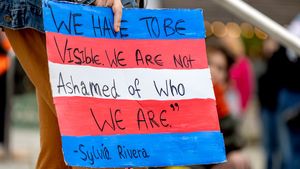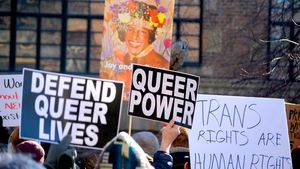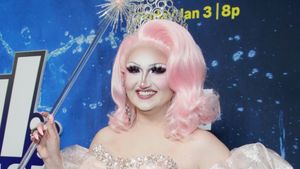"If you would've asked me, 'Will you make another album?', I don't think I would have been able to answer," says Robyn, discussing the eight-year gap between her latest LPs. "Everything was kind of disintegrating for me." The Swedish mononym, a.k.a. Robin Miriam Carlsson, purveyor of some of the catchiest and most emotionally cathartic dance songs possible, essentially dropped out of sight after the release of her 2010 album, which contained one of her biggest hits, "Call Your Girlfriend." And in the intervening years she became one of the most sought-after fugitives from the beat.
Related | Gallery: Every Breathtaking Image From Our Robyn Cover Shoot
Why? None of the usual reasons for such a vanishing applied: It wasn't record-company problems, rehab, or post-megahit pressure. Instead, even for a genre that prizes its divas' capacity to perform suffering in public, Robyn was really going through it. "I was dealing with a life crisis," she says. "I was in therapy and a friend of mine had passed away. I was not in a stable part of my life at all. I was very raw and unable to keep myself composed."
That a sprightly pop hitmaker might be debilitated by depression shouldn't be surprising today: Who among us hasn't melted down a few times in the last few years? But something was always up with Robyn. Ever since her debut in 1995, she broke the mold: She was spunky, blonde, and elfin, but seemed world-weary and sometimes literally fatigued, while her smash stompers "Dancing on My Own" and "Call Your Girlfriend" contained lyrics that were unusually spiky, if not a bit scandalous. The premise of "Dancing on My Own" was the very fear that keeps many of us at home on Saturday night -- the terror that, in the words of Morrissey, you'll go out to a bar and "stand on your own, and leave on your own, and go home and you['ll] cry and you['ll] want to die." And yet, Robyn's track made a jubilant celebration of that scenario. "Girlfriend" presented a whole different narrative -- it was the rare dance hit sung from the perspective of the other woman, goading her new love into breaking up with his ball-and-chain...until you in fact rooted for the mistress.
There was serious thematic alchemy there -- a wit, edge, and emotional intelligence that brought Robyn closer to the 1985 Smiths than 2008 Kylie, but over a grid of sugary beats. It was as if ABBA's entire career had been "The Visitors" -- catchy as fuck but, on reflection, a very dark and rich dessert.
 Suit by Acne Studios. Vintage bodysuit. Shoes by Versace (vintage).
Suit by Acne Studios. Vintage bodysuit. Shoes by Versace (vintage).
And it was a clear deviation from her early days: Two tracks from her debut album Robyn Is Here hit Billboard's Top 10 in the vast pop wasteland of 1997, both of them masterminded by super-producer Max Martin. Eight years later, determined to be more Swizz Beatz than Britney, Robyn extricated herself from both producer and label, founding her own imprint, Konichiwa Records. That setup enabled her masterpiece, Body Talk (compiled from three EPs) to ignite the world in 2010 -- the year Robyn packed up her ThreeAsFour purse with dance chart hits, Pitchfork raves, and Saturday Night Live performances and ran away with them.
Unfortunately, the years around Body Talk's release were tough ones for the commercial dance diva, a period that saw not one, but three Great Blonde Hopes of dance run aground for reasons beyond their exceptional work. In addition to Robyn, Norway's Annie, the indie princess and DJ who emerged out of mixtape culture, exploded out of the gate but saw her excellent second album neutralized by record-company indifference. And the U.K.'s Roisin Murphy, a sleek and lovely fashion plate who effortlessly toggled between ice queen and best mate, also fell victim to label hassles and spent her own years in the wilderness. In a perfect world, all three would have scored Madonna-level promotion and popularity, and of the three, only Robyn came close to meeting commercial expectations (literally somersaulting across the stage as a musical guest on SNL -- a gig that requires a serious element of pop heft). Annie was fun, Roisin was fun and dazzling, Robyn was fun and the musical equivalent of a best friend's shoulder for tear absorption -- a snaggletooth with a bowl cut who actually sold records. All of this rendered her disappearance especially surprising.
"I never felt there was a point when I decided to quit music," says Robyn, now 39. "I knew I wanted to make another album. But because it was such a searching process for me, and I was kind of showing everyone everything up-in-the-air, I became friendly with the idea that I couldn't control that process, either."
What emerged from her exile couldn't sound more polished: Honey, her new album, looks set to save us from the diminishing returns of the dance-pop world's Ariana Grandes. The tracks that a reporter has been allowed to preview are roundly excellent -- euphoric stompers and satiny mid-tempo chill-outs, each one pure hooky satisfaction from the first chorus, thoroughly belying a production period of internal drama. "I think I pulled it off," Robyn says. "I made a very personal album that comes from a very honest place. And it's not just like 'Oh, I'm being honest about how I feel.' It's more like an honest emotion. I wanted it to be unfiltered."
 All clothing vintage.
All clothing vintage.
In late July, Robyn announced one of the new tracks, "Missing U," with a "message to my fans," a documentary video on YouTube. Set in a spin class populated with very ordinary, non-model-esque types, the video begins with a young guy talking about what happened when he heard Robyn's 2014 collaboration with Royksopp during a recent workout: "The last time I took this class, he played 'Monument,' and halfway through, I just started to cry because it's inspirational and beautiful but also just so sad," he says. "And it doesn't matter where you're at in your life -- you could have just bought a house, or your girlfriend could have just broken up with you or something, and there's still an emotion there, in that song, that you can touch."
As revealed in the video, the young man turns out to be a DJ who hosts a Robyn-themed party in Brooklyn called The Party Is Killing You: A Night of All Robyn Everything, which is regularly packed to capacity. On camera, he and his partners attempt to lure Robyn for a guest appearance by asking partygoers -- queer and non-queer alike -- to record messages for her about what her music means to them: Some are joyous, and many tearful, as they talk about isolation and coming to terms with their otherness, from size to sexual orientation. (Spoiler: Robyn shows up for the party in the video and stage-dives into what becomes a gigantic hug.)
Of the track itself, Robyn says in the clip, "'Missing U' is about the trippy thing that happens when people disappear. They become even more clear."
Scanning through the video's 500-plus comments, it's clear that Robyn's fan base feels a devotion to her that is almost Garland-esque -- that she understands their pain and enables them to work it out on the dance floor. While your average page of comments on a Beyonce video is an unbroken string of variations on the sentiments "Yassss" and "Slay," the feedback on a Robyn video reads like a diary.
"The moment that guy started talking about 'Monument,' I teared up -- that's exactly how i feel listening to that song," said one commenter.
"Going through the hardest breakup of my life and finding out I was replaced soon after, during the time 'Dancing on My Own' came out, helped me overcome things and made me realize that life goes on, and we have to keep dancing on our own through the heartache until it's gone," wrote another. "From that moment, Robyn's music became the soundtrack of my life, because it's so real and relatable."
"Your music has comforted me when I was hidden in the closet and when I came out, when I fell in love and when I was heartbroken," says another. "Thank you for making me feel comfortable about embracing my sadness."
Some might be a little too hopeful. "Our queen has risen again to save the world of pop music," wrote another commenter. "She's gonna kill Trump. I feel it."
 Top by Lisolotte Bramstang. Skirt by HAAL.
Top by Lisolotte Bramstang. Skirt by HAAL.
For her part, Robyn believed that she could ultimately write herself out of her existential funk, but first she had to be sure she had something to say to the people who have come to hang on her every word. "I knew what kind of album I wanted to make, but I didn't know how to be good," she says with a laugh. "It was not a time where I was able to just be this secure person. I really didn't feel like I knew what I wanted to say. And I didn't feel like I necessarily should say anything at that point."
All recording artists might do well to be wary of wasting their followers' time. "I think taking up space in people's lives really requires you to think about what it is you want to say," the artist continues. "If you're going to take on that task, you better have something good to contribute to people. That was a big part of why it took so long. I didn't want to make something that felt unclear or didn't feel like it came from the right place. I also needed to just really dig deep into myself. That took time."
Determined to stretch, Robyn wrote more of the album than she had in the past and taught herself to program beats, shutting herself in her home studio for more than a year. "I just spent time listening to music that I love, dancing, and feeling things out," she says, adding that she jammed to her all-time favorites: Prince, "Spring Affair" by Donna Summer, and "Rock Your Baby" by George McCrae, not to mention copious helpings of Diana Ross and Michael Jackson. Also, "I read lot of books that inspired me and informed my writing -- books about psychology and human behavior, science and the science of human history," she says.
But the resulting tracks are no academic exercise. Like a sequel to "Girlfriend," "Honey" finds Robyn cooing, "You're not going to get what you need / baby, I have what you want," over a mesmerizing 3 a.m. keyboard line, to a suitor who probably shouldn't be listening. "Suck it up like a treasure...let it go like a debt...I got your honey, baby." (An early version of the song played on HBO's "Girls" last year, but as we speak, Robyn is still reworking the mix.) "Ever Again" is as clean and lean a mid-tempo jam as there ever was, before it explodes a silvery keyboard Easter egg.
And for all its symbolic and thematic import as a song about the friend whose passing caused Robyn to collapse into herself, "Missing U" shimmers on irresistible neon-icicle beats that evoke the entrance music to Oz, over lyrics that capture the global aftershocks of heartbreak, turning enervating grief into dancehall euphoria.
Robyn calls the album "sensual," although she refers less to carnality than being fully present in the moment (helpful when creating a product meant to be consumed on a dance floor). "I liked that honey is a word people use all the time for their loved ones: It means so much and nothing at the same time," she says. "Also, the substance is amazing and sweet and tasty and also kind of weird: It's something animals make that we eat, and it's a mythological substance that has been used in a lot of different religions. So it felt both mysterious and everyday for me. I just kept thinking about that word and how I was trying to find this sweet spot where I felt comfortable, able to enjoy being in my own body and finding a place of pleasure again for myself. I felt very sensual, very uplifted."
Honey is slated for release before the end of the year, and Robyn is planning to support it with a big, international tour in 2019. But for her the project has been simultaneously smaller and more epic. "I have learned how many emotions you can have in a day and how to navigate them and be in touch with them without letting them control or ruin anything for you," she says of the album's creation. "It's about being OK with things being very unstable and undefinable sometimes. It's very mysterious. We think we're in control, but really we aren't. Nobody really knows anything about why we're here. That was the big new perspective for me, and that's just the way it is to be a human being."
Photography by Fredrik Altinell. Styling by Denise Ostholm. Makeup by Linda Ohrstrom. Photography Assistant, Magnus Petersson.
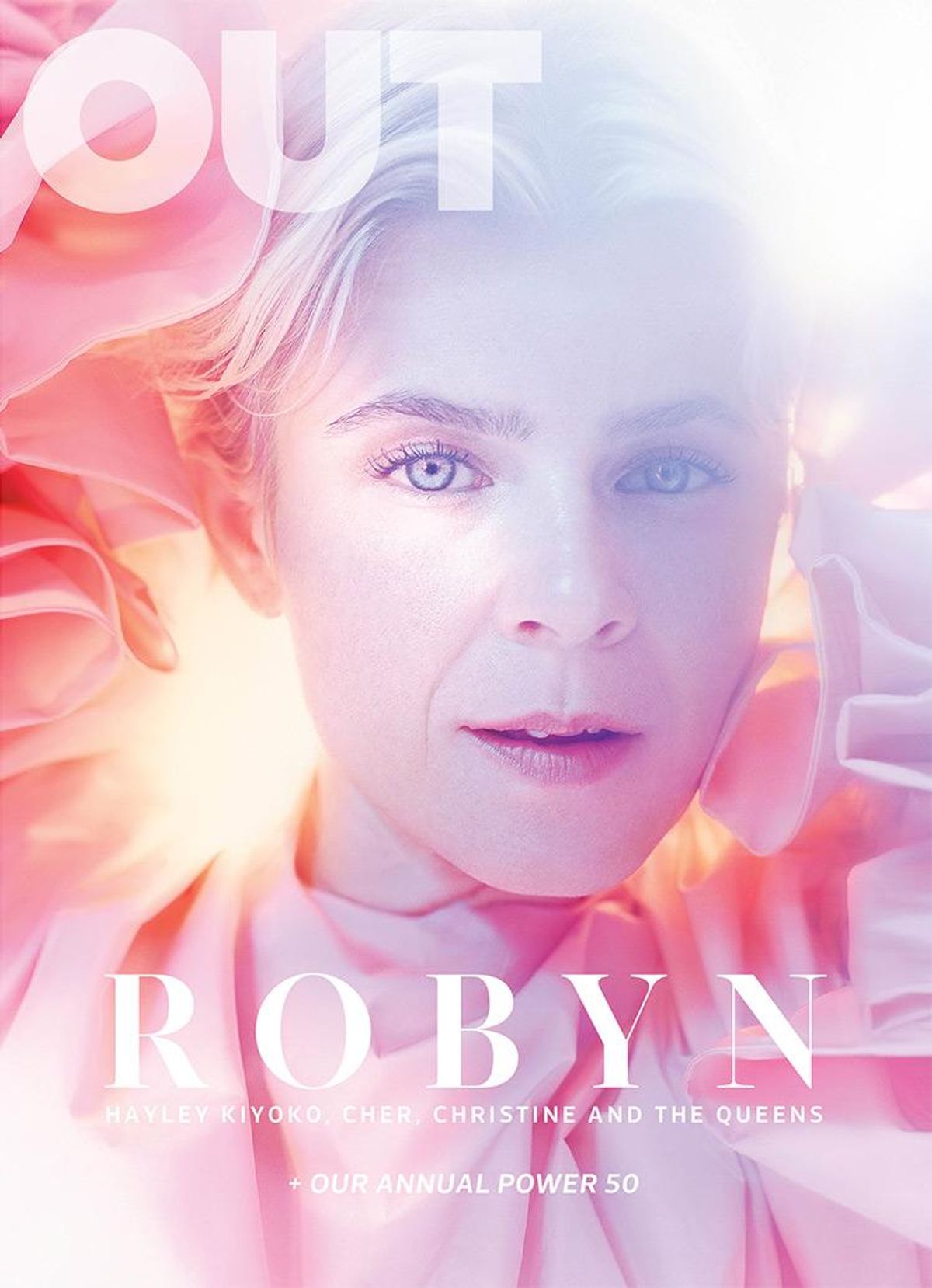









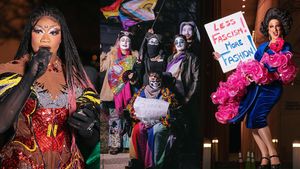







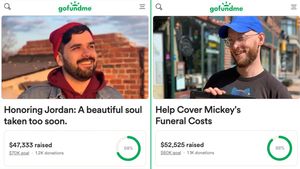







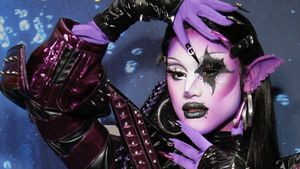







 Suit by Acne Studios. Vintage bodysuit. Shoes by Versace (vintage).
Suit by Acne Studios. Vintage bodysuit. Shoes by Versace (vintage). All clothing vintage.
All clothing vintage. Top by Lisolotte Bramstang. Skirt by HAAL.
Top by Lisolotte Bramstang. Skirt by HAAL.



